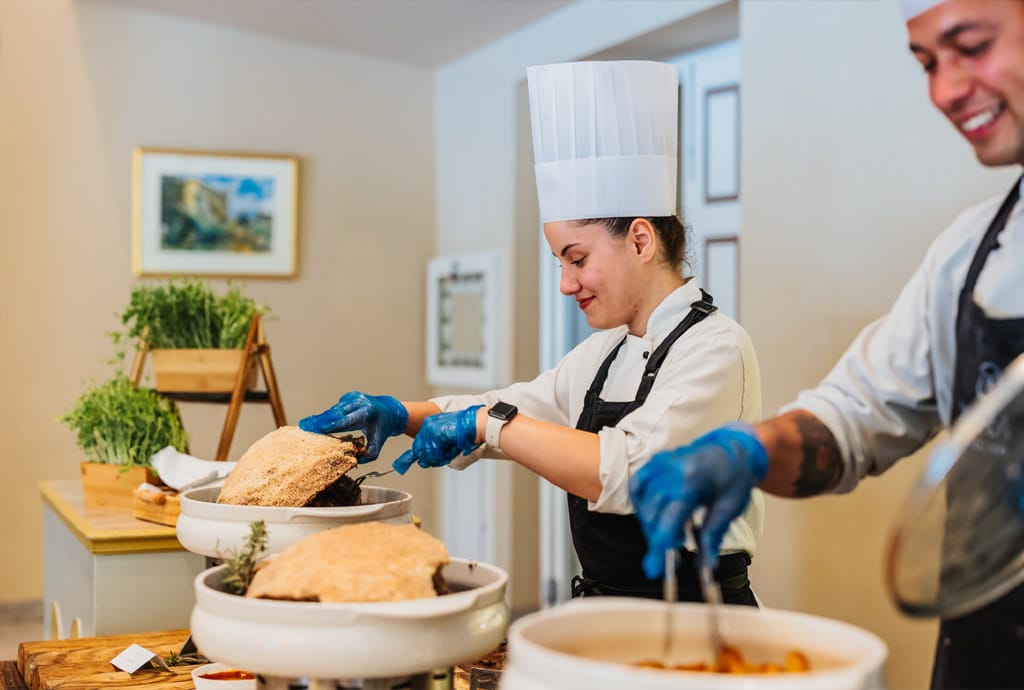
Who’s Serving the Soul of Malta ?

Malta’s Green Shift – A New Way to Explore the Islands
October 11, 2025
Unlocking the Apertif: A Ritual of Taste, Culture & Quality
October 11, 2025
What will it take for the locals to return to the
hospitality industry and view it as a career?
Denis Jin Young L. ponders the question.
Malta Sabiħa - two simple words that carry profound meaning. Malta is beautiful, and that explains why millions of tourists, year after year, journey from every corner of the globe to experience our island.
They don’t just come for the sun and sea - they come for something deeper. Malta’s soul. Its character. Its beauty. This is the essence of Malta Sabiħa.
Picture this. You’ve just landed in Malta. The sun’s shining, the sea is shimmering like a postcard, and you sit down at a local café in Spinola Bay. You ask the waiter,
“What’s the story behind this dish?” And he replies - not with history or passion-but with, “I don’t know, I’m not from here.”
And right there - that seemingly small moment - is what we need to talk about.
We’re in the business of hospitality. And hospitality isn't just about plates, pillows, and polite smiles. It's about story. Culture. Connection.
Visitors to Malta don’t just come for beaches and sunshine-they come for an authentic experience. They come to meet us.
But what happens when the connection is missing?
A hospitality industry without the locals
In Malta today, chances are the person serving your food, checking you into your hotel, or driving your tour bus isn’t Maltese. In fact, many have never even lived in Malta for long.
Our hotels, our restaurants, even our corner snack bars are powered by foreign workers - many of them hardworking, respectful, and committed-but often disconnected from what Malta actually is.
And let’s be real: this didn’t happen by accident. The truth is, Maltese people - especially the younger generation - have been walking away from hospitality jobs for years. The wages are low. The hours are brutal.
And there’s this unspoken belief that working in hospitality is beneath them. That it’s not a ‘real career’. That it’s for others.
This attitude isn’t harmless; it’s quietly costing Malta something special.
Hospitality: our living story
Hospitality isn’t just a job - it’s Malta’s living story told daily. It’s our chance to show the world who we are. It’s our front line. Our welcome mat. Our story served daily - one check-in, one dish, one smile at a time.
But right now, the people delivering that experience often don’t know that story. Not because they don’t care - but because we haven’t given them the tools to learn it. We house them, yes. We give them uniforms, yes.
But do we teach them why the luzzu boats have eyes painted on them? Do we explain why the bells ring so loudly on Sunday mornings? Do we show them how fiercely Maltese people have fought for their identity - for their language, their freedom, their space on the map?
The customs, the quirks and charms-these things matter deeply to visitors seeking genuine experiences. Sadly, not often enough.

Malta is still writing its own story
Malta is still a teenager in terms of country years. Independence? That was 1964. Republic? 1974. That’s less than a lifetime ago. Maltese identity is still evolving, carrying with it centuries of complexity-often misunderstood, mislabelled, and undervalued.
The Maltese have been called ‘too Arab’ for Europe, ‘too European’ for the Arab world. The Maltese language-a linguistic masterpiece rooted in Arabic but peppered with Italian, English, and French-has even been dismissed as a dialect. A dialect! As if it didn’t carry the weight of a people who survived sieges, invasions, and endless waves of occupation.
So yes, Maltese people are sensitive about identity. And rightly so. Because they’ve had to fight just to be seen.
Yet, ironically, the very industry that could help them tell their story-hospitality-is increasingly outsourced, not necessarily because we want it that way, but because fewer locals see hospitality as a meaningful path.
So, what to do?
Do we kick out all the foreign workers? Absolutely not. That would be both cruel and foolish. These people have become part of our fabric. They’ve shown up when we needed them most.
But we owe it to them - and to ourselves - to do better.
We must stop treating foreign workers as tools and start treating them as partners. Give them proper training, not just in operations, but in Maltese culture. Teach them the language - yes, Maltese. Let them say “merħba” with pride, not just because it sounds nice, but because it truly means welcome.
And maybe, just maybe, if we shift our mindset, young Maltese will see hospitality differently too. Not as a fallback. Not as something beneath them. But as a meaningful career. A craft. A way to represent their country with passion and purpose.
Imagine walking into a restaurant in Valletta and being served by someone - local or foreign - who gets it. Who knows where the dish came from, what the Maltese cross means, why festas are wild, beautiful chaos. Someone who feels like Malta.
That’s not just good service. That’s the real Malta.
Final Thought: it’s not about who serves, but how they serve
Tourists don’t remember the thread count of their hotel sheets-they remember how they felt. They remember that warm conversation, that story about the Knights, or that local tip about the perfect spot to watch the sunset.
Whether these moments come from a local or a well-integrated foreign worker doesn't matter, the experience is authentic. As long as it reflects Malta’s heart.
Ultimately, building a world-class hospitality industry isn't about adding more uniforms; we need more understanding, more integration, more Maltese Soul. It's about offering meaningful cultural training programs, teaching Maltese language basics, history, and local traditions, and providing better working conditions for all hospitality workers.
By empowering everyone-locals and foreigners alike-with the knowledge, respect, and tools they need, we ensure that visitors encounter the authentic Malta they're looking for.
Because true hospitality isn't just good service-it is Malta’s identity, proudly shared with the world. And when we achieve this, everyone benefits-not just our guests, but Malta itself.

Denis Jin Young L.
Denis Jin Young L., a seasoned consultant in the hospitality sector with over three decades of experience, has called Malta his home for over eight years. Presently, he is the Director of Hospitality at the Xara Collection, which includes a variety of establishments such as the Villa Barumbara tal-Laring, the Xara Palace Hotel, Relais & Châteaux, Xara Catering, the Xara Lodge, Oka’s at the Villa, Medina restaurant, Trattoria 1530 AD, the de Mondion restaurant, Rosami at the Villa and the Xara Gardens.
Click here to see Horeca Issue 21 online



